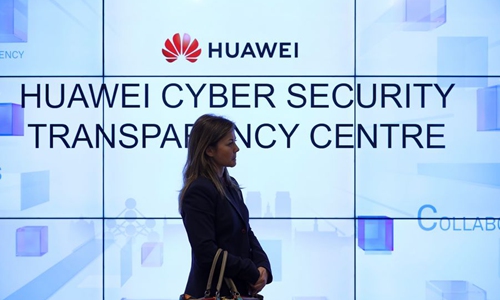HOME >> SOURCE
Merkel’s Christian Democrats not to ban Huawei in Germany
By Zhang Dan Source:Global Times Published: 2020/2/13 15:49:48

A woman listens to a debate at Huawei Cyber Security Transparency Center in Brussels, Belgium, on Jan. 30, 2020.(Xinhua/Zhang Cheng)
German Chancellor Angela Merkel's ruling conservatives reached an agreement to stop banning Huawei in the country, a move that rebuffs the US government' call and it may set an example for other European countries to follow, experts say.Drafted by Christian Democrat leaders, the agreement in written form outlined Germany should set out a risk-management approach rather than impose bans on any individual companies, according to German news outlet Die Welt.
It is notable that the document at the same time recommends tougher rules for foreign telecom vendors, saying, "Equipment makers can only be trusted if they verifiably fulfill a clearly defined security catalogue that rules out any influence from a foreign state on our 5G infrastructure," Reuters reported citing the document.
For example, the use of strong cryptography and end-to-end encryption can secure confidentiality in communication and the exchange of data, it noted.
After a month-long dispute within German parties, Germany's decision will lead other countries in EU to follow, with most finalizing their decisions in the second half of this year, Xiang Ligang, a telecoms industry expert who closely follows Huawei told the Global Times.
He noted 2020 is set to be a year that the next-generation 5G networks will boom, urging countries to make their independent decisions.
Putting political pressure aside, it is a fact that Germany accounts for about 30 percent of the EU's 5G market, which is "enough for pan-EU operators to follow its lead," Jacob F. Kirkegaard, a senior fellow at the Washington-based Peterson Institute for International Economics, told US media outlet Voice of America.
Germany, Europe's largest economy as well as the most populated EU member, remains the second major country in Europe after Britain to allow the Chinese telecom giant to assist in its local 5G infrastructure rollout.
Their decisions both refuted US President Donald Trump's calls for US allies to bar Huawei from their 5G constructions.
Immediately following the agreement from Germany's ruling parties, the Pentagon is likely to put new restrictions on Huawei, making it harder for US companies to supply the Chinese company, Reuters reported.
Industry insiders told the Global Times that even if some countries adopt Huawei's equipment, they would not trust its core parts and may gradually replace them. Vodafone is set to remove Huawei equipment from the core parts of its mobile networks in Europe, media reports said.
However, despite scrutiny from foreign countries, "most European countries will adopt Huawei," Xiang said.
"China's mature deployment of 5G networks has brought pressure to the rest of the world, which could be reflected in the country's ongoing battle against the deadly epidemic," Xiang noted, pointing out that drone patrols, robotic deliveries and remote diagnosis systems are working well in China. He said China has rolled out 150,000 5G base stations.
Europe has become the largest 5G market for Huawei outside China, where the company has obtained more than 60 commercial 5G contracts, with at least 32 coming from Europe.
Posted in: COMPANIES